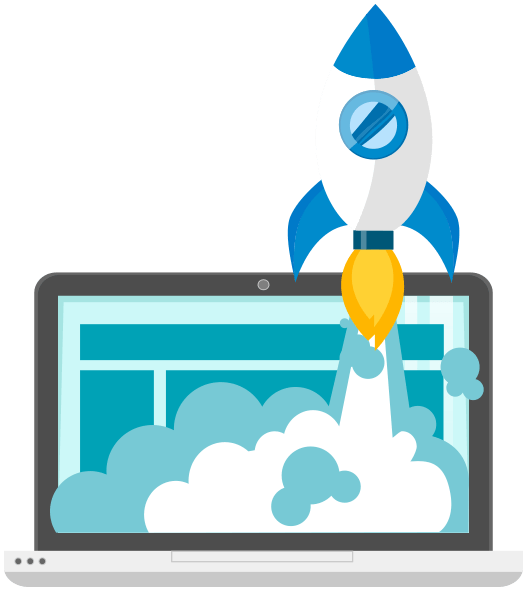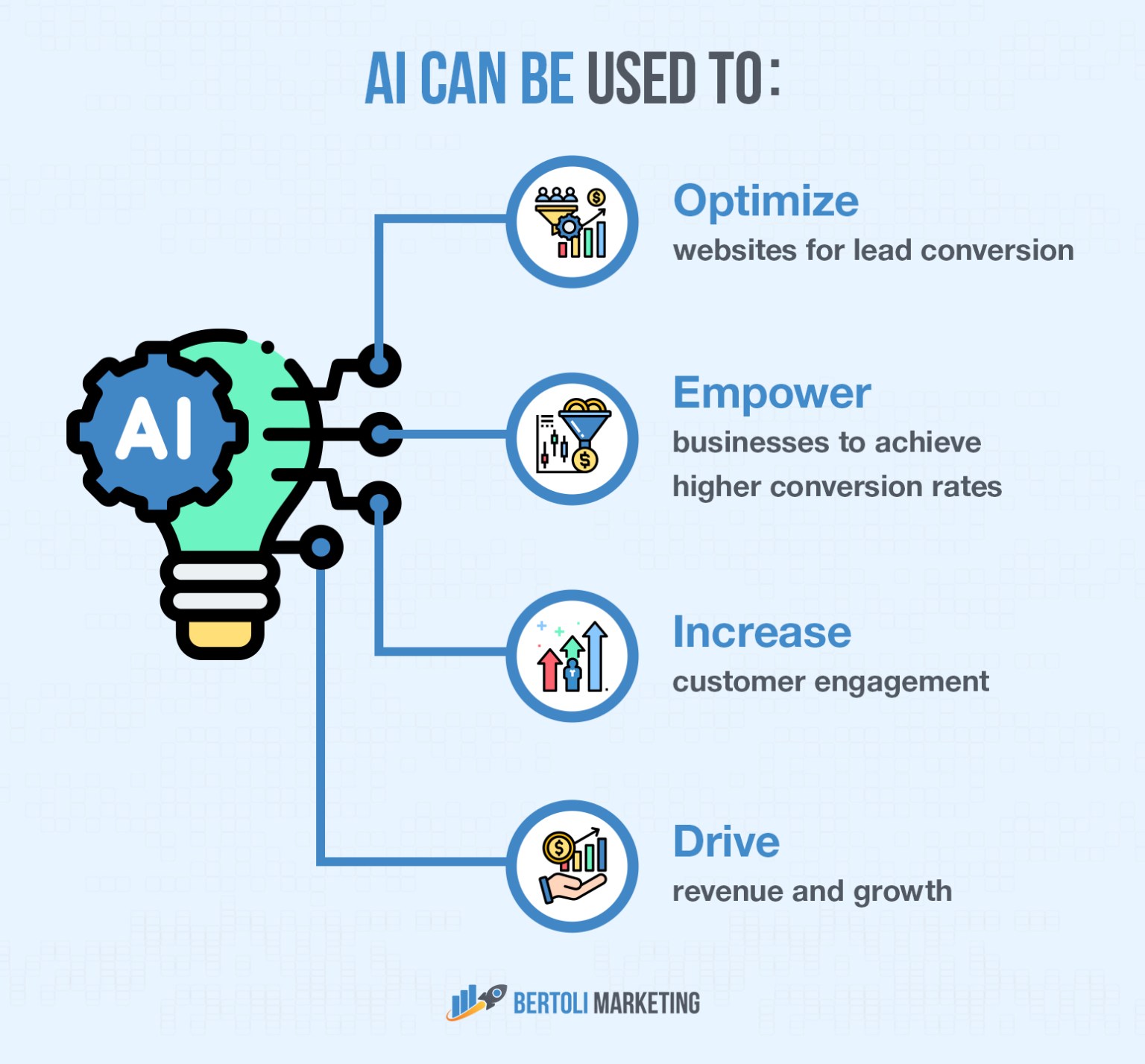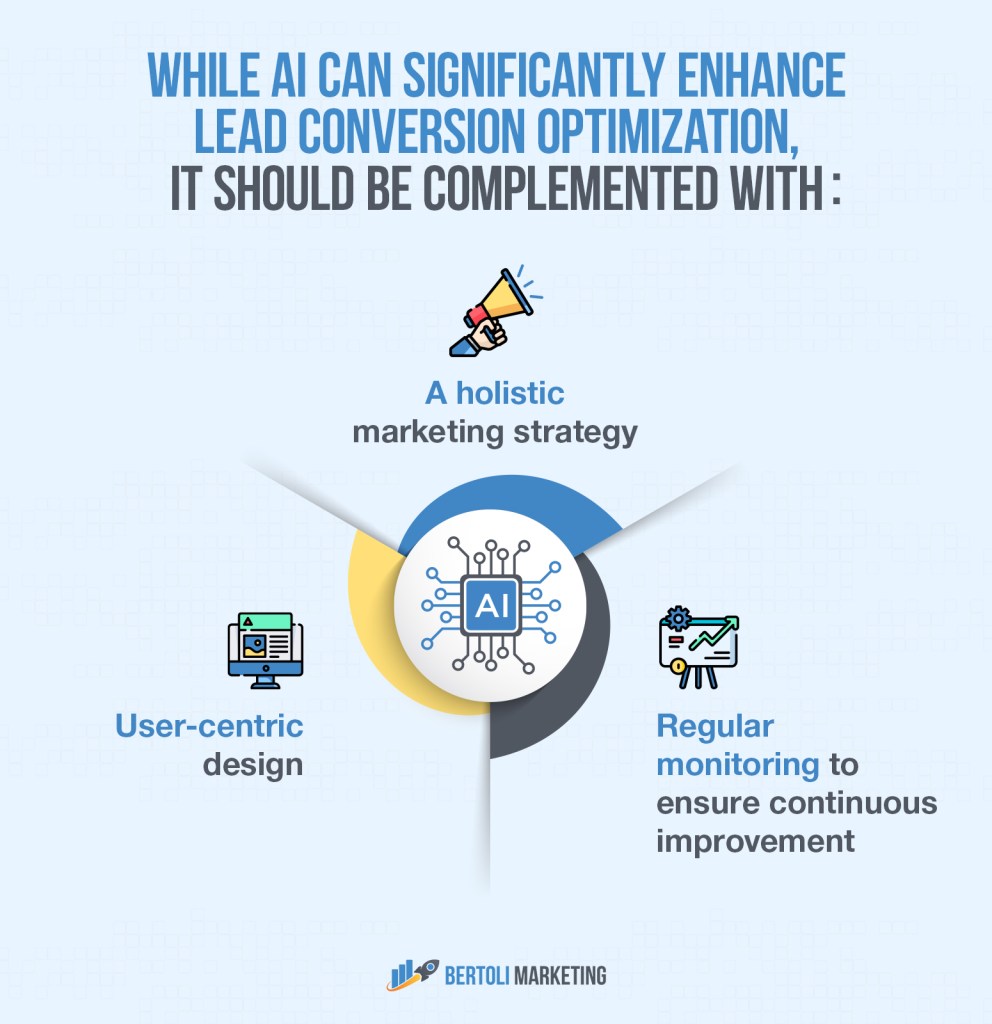AI-Powered Website Optimization
Using our proprietary AI technology, we’ll develop a strategy to optimize your website conversion rate up 200-1700% with guaranteed results!


Our Proven Strategy
- Collect & Analyze Data To Train AI Models
- Define Lead Conversion Goals
- Implement Tracking & Analytics
- Personalize the User Experience
- Optimize All Website Elements
- Implement Chatbots & Virtual Assistants
- A/B Test & Optimize Traffic Flow
- Develop Lead Segmentation & Targeting
- Monitor & Iterate AI-Driven Strategies
Get Your AI-Powered Website Optimization Audit
300% Average Conversion Rate Increase
Optimizing your website for conversions involves strategically placing CTAs, optimizing landing pages, and streamlining the user journey. A fully optimized website effectively guides visitors through the conversion funnel, resulting in higher conversion rates for sign-ups, purchases, inquiries, or other desired actions.
40% Increase in Content Binging
Optimizing your website for speed improves loading times, reducing bounce rates and improving user retention. Users expect fast-loading websites, and a fully optimized website delivers a smooth and responsive browsing experience across devices and network conditions.
Improved Mobile Experience
With the increasing prevalence of mobile browsing, optimizing your website for mobile devices is crucial. A fully optimized website is responsive and mobile-friendly, providing a consistent and user-friendly experience across desktops, smartphones, and tablets.
Request Website Audit
Learn About All the Ways We Can Optimize Your Website With Artificial Intelligence
Data Analysis and Predictive Modeling
AI allows businesses to analyze vast amounts of data collected from various sources, including website analytics, user behavior, and demographic information. By employing machine learning algorithms, AI can identify patterns, correlations, and insights that can be leveraged to optimize lead generation strategies. Predictive modeling helps forecast customer behavior, enabling businesses to target their efforts effectively.
Define lead conversion goals
Determine what constitutes a successful lead conversion for your website. This might be a purchase, a newsletter sign-up, a contact form submission, or any other action that aligns with your business objectives. On-page optimization and appropriate keyword saturation is what your website needs to drive organic traffic to your website and allow that traffic to self-identify. Embedding the right keywords and the right CTAs throughout your website can allow for conversion rates to increase for negligible to 5-7%.
Implement tracking and analytics
Set up tracking tools like Google Analytics or other web analytics platforms to monitor user activity on your website. This will help you gather valuable data on user behavior, traffic sources, and conversion rates.
Create a predictive model
Utilize machine learning algorithms to build predictive models that analyze the collected data and identify patterns that contribute to lead conversion. This can be achieved through techniques like regression analysis, classification algorithms, or even deep learning models. B2B marketers know the importance of content as the content that you produce establishes your expertise in your respective industry, showcases your solution and value propositions, and validates your success.
Optimize website elements
Use AI algorithms to optimize various website elements, such as headlines, call-to-action buttons, layouts, and forms. AI can help you test different variations and identify the most effective design and messaging elements for improving lead conversion rates. Tweaks in your communications and automation can be the difference between annoying your subscribers and providing immense value and thought leadership. Effective workflows can streamline hand-raisers to sales effectively and efficiently for immediate follow-up, which is proven to convert more leads to opportunities.
A/B testing and optimization
Continuously test and optimize different versions of your website using A/B testing, where AI algorithms can help automate the process. This allows you to experiment with various layouts, designs, and content to identify the most effective combinations. At the end of the day, marketers need to show upper management the successes that were generated by their efforts. Failure to do so can cause a reduction in budget and staff. Let us work with you to showcase marketing's success throughout the sales journey.
Behavioral targeting
AI can analyze user behavior data to identify patterns and preferences, allowing you to target specific visitors with personalized content and offers. By delivering relevant messages and incentives, you can increase the chances of converting leads into customers. B2B marketers know the importance of content as the content that you produce establishes your expertise in your respective industry, showcases your solution and value propositions, and validates your success.
Lead scoring
Implement AI-powered lead scoring systems to prioritize and focus your efforts on leads that are more likely to convert. AI algorithms can analyze various factors such as engagement levels, demographics, and past behavior to assign a score to each lead, helping you allocate resources effectively. Tweaks in your communications and automation can be the difference between annoying your subscribers and providing immense value and thought leadership. Effective workflows can streamline hand-raisers to sales effectively and efficiently for immediate follow-up, which is proven to convert more leads to opportunities.
Dynamic pricing and offers
Utilize AI algorithms to dynamically adjust pricing and offers based on various factors like demand, customer preferences, and competitor pricing. This personalized pricing strategy can entice visitors to convert by presenting them with attractive and tailored deals. At the end of the day, marketers need to show upper management the successes that were generated by their efforts. Failure to do so can cause a reduction in budget and staff. Let us work with you to showcase marketing's success throughout the sales journey.
Predictive analytics
Leverage predictive analytics to forecast future trends, identify potential bottlenecks, and proactively optimize your website for lead conversion. AI algorithms can analyze historical data and provide insights to help you make informed decisions about website optimization strategies.
Natural language processing (NLP)
Implement NLP techniques to analyze customer feedback, reviews, and support tickets. AI-powered sentiment analysis can provide valuable insights into customer satisfaction, pain points, and opportunities for improvement, enabling you to refine your website and enhance lead conversion.
Voice search optimization
With the rise of voice-enabled devices, optimizing your website for voice search can improve lead conversion. AI algorithms can help you understand and optimize for natural language queries, allowing your website to provide accurate and relevant responses to voice search queries.
13. User journey optimization
AI can analyze user journeys and identify areas where visitors tend to drop off or encounter difficulties. By identifying and resolving these pain points, you can streamline the user experience and increase the chances of lead conversion. B2B marketers know the importance of content as the content that you produce establishes your expertise in your respective industry, showcases your solution and value propositions, and validates your success.
Multichannel optimization
Extend your AI-driven optimization efforts beyond your website to other channels, such as social media, email marketing, or mobile apps. AI algorithms can help you personalize and optimize each channel to maximize lead conversion across the entire customer journey.
Continuous learning and adaptation
AI models can be continuously trained and updated with new data to improve their accuracy and effectiveness over time. Regularly review and refine your AI algorithms based on feedback, insights, and evolving user behavior to ensure ongoing optimization for lead conversion.
Compliance and ethical considerations
Keep in mind legal and ethical considerations related to AI usage, such as data privacy, transparency, and algorithmic fairness. Ensure that your AI-driven optimization strategies adhere to relevant regulations and ethical standards to build trust with your audience.
Predictive lead generation
AI can assist in predicting potential leads by analyzing patterns and characteristics of your existing customer base. By using predictive lead generation algorithms, you can identify individuals or companies that are more likely to convert into leads, allowing you to focus your efforts on those high-potential prospects.
Automated lead nurturing
AI-powered chatbots and email automation can be used to nurture leads throughout their journey. Chatbots can engage with visitors, answer questions, and provide relevant information, while automated email campaigns can deliver personalized content and offers based on user behavior and preferences.
Customer lifetime value (CLV) prediction
Utilize AI algorithms to predict the lifetime value of your leads or customers. By understanding their potential value, you can prioritize your efforts on leads with higher CLV, tailor your marketing strategies accordingly, and optimize for long-term customer retention and upselling opportunities.
Dynamic content optimization
AI can help optimize your website's content by analyzing user behavior, preferences, and engagement data. By dynamically adjusting content elements, such as headlines, images, testimonials, or product recommendations, you can create personalized experiences that resonate with your visitors and increase lead conversion rates.
Click and heat mapping analysis
AI-powered click and heat mapping tools can provide insights into how users interact with your website. By analyzing these visual representations, you can identify areas of high engagement, as well as potential usability issues or conversion barriers. This information can guide you in making data-driven design and layout improvements.
Conversion rate prediction
AI algorithms can analyze historical data to predict conversion rates for different segments, campaigns, or landing pages. This predictive capability allows you to allocate resources and optimize your efforts on the areas that are likely to have the highest impact on lead conversion, resulting in better resource utilization.
Voice of the Customer (VoC) analysis
AI-powered text and sentiment analysis can help you extract insights from customer feedback, reviews, and social media conversations. By analyzing the Voice of the Customer, you can gain a deeper understanding of their needs, pain points, and preferences, allowing you to optimize your website and messaging to improve lead conversion.
Competitor analysis
AI can be used to monitor and analyze your competitors' websites and marketing strategies. By leveraging AI-powered tools, you can gain insights into their conversion tactics, pricing strategies, messaging, and promotions. This information can help you identify areas for improvement and develop competitive advantages to enhance lead conversion.
Continuous experimentation and optimization
Implement a culture of continuous experimentation by using AI algorithms to conduct ongoing A/B testing, multivariate testing, and optimization of various website elements. By systematically testing different variations, you can uncover insights and implement changes that drive higher lead conversion rates.
Customer segmentation and targeting
Utilize AI to segment your website visitors into different customer groups based on their behavior, demographics, or preferences. This segmentation enables you to target specific groups with personalized messaging and offers, improving conversion rates.
28. Personalized User Experience
AI-powered personalization enhances the user experience by tailoring content, offers, and recommendations to individual visitors. Through AI algorithms, businesses can analyze user preferences, browsing history, and demographic data to deliver relevant and customized experiences. Personalization creates a sense of engagement and builds trust, increasing the likelihood of lead conversion.
Chatbots and Virtual Assistants
AI-powered chatbots and virtual assistants provide instant and personalized support to website visitors. These AI-driven tools can engage with potential leads, answer queries, and provide assistance, guiding users towards conversion. Chatbots can collect relevant lead information, qualify prospects, and offer real-time assistance, improving the overall lead generation process.
Conversion Rate Optimization
AI plays a vital role in optimizing conversion rates by continuously testing and optimizing various website elements. Through A/B testing and multivariate testing, AI algorithms can identify the most effective combinations of headlines, calls-to-action, layouts, and forms that lead to higher conversions. This iterative process helps businesses maximize lead conversion rates and improve overall website performance.

